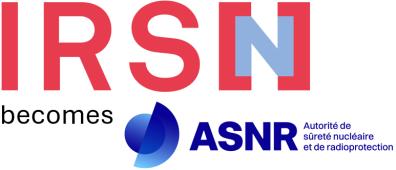IRSN research evaluation
Scientific evaluation is essential to the quality and relevance of the IRSN's research. It supports progress aimed at scientific and technical excellence, contributes to the external recognition and credibility of the Institute, and helps guide research. For the IRSN, it is based on the overall evaluation of the Institute as a research organization as well as on "targeted" evaluations by research theme. The overall evaluation of the IRSN is conducted every five years by the High Council for the Evaluation of Research and Higher Education (Hcéres). Targeted evaluations are carried out, under the responsibility of the IRSN's Executive Director forScientific Evaluation, by an external evaluation body specific to the IRSN and validated by Hcéres.
Evaluation of the Institute
Like all public organizations conducting research activities, the IRSN is evaluated every five years by Hcéres. During this overall evaluation, the IRSN submits its scientific strategy associated with its research, organization and governance to a committee of experts appointed by Hcéres. After the first evaluation conducted in 2012 by the Research and Higher Education Evaluation Agency (Aeres), which preceded Hcéres, the last evaluation was conducted in 2018. The conclusions of the Hcéres report confirm the IRSN's commitment to research and its progress.
Evaluation of IRSN Research Units
External Evaluation Body of the IRSN
The evaluation of the research units provides an external perspective and an independent opinion on the research activities of the IRSN, also meant to be submitted to the profit of the entity evaluated. It is assembled according to the usual evaluation criteria, but also to answer questions raised by the researchers themselves or their management
Since 2004, such thematic evaluations have been organized by the Evaluation Department and then the IRSN's Scientific Department, and conducted by a visiting committee made up of independent experts. With this experience, the Institute has chosen to structure its own evaluation body whose organization and procedures were validated by Hcéres in March 2017. This body is based on a principle of organization and a work methodology including:
- specialized evaluation committees, each composed of 5 to 7 independent experts evaluating thematic research groups. Typically, this results in creating an evaluation committee for each IRSN thematic research group;
- a visiting committee, successor to the visiting committee who carried out the research evaluations since 2010. As a subset of the community of experts forming the body, its members are appointed for five-year terms by the Director general on the proposal of the Executive Director for Scientific Evaluation, for the purpose of adaptation to the research activities of the IRSN, and are each called upon to chair a committee. Unlike the other experts who intervene on an ad-hoc basis in an evaluation committee, the members of the visiting committee ensure the coherence of all the committees by a follow-up of the evaluations and the resulting action plans;
- an Executive Director for Scientific Evaluation assigned by the Director general of the IRSN, responsible for guaranteeing the respect of the evaluation principles and their organization, leading the body and assisting the chair of the visiting committee in his or her duties.
Organization
Scheduling
In order for each of the thematic research groups to be evaluated every five years, in accordance with the Hcéres evaluation rate, the evaluation body conducts on average 2-3 evaluations per year.
Their scheduling is defined in a five-year plan by the Executive Director for Scientific Evaluation in consultation with the chair of the visiting committee and the IRSN thematic research group management, then sent to Hcéres.
Composition of Committees
Each member of the visiting committee is appointed by the Executive Director for Scientific Evaluation and the chair of the visiting committee to chair an evaluation committee. Each chair was chosen at the time of the formation of the visiting committee with the authority and skills required for the evaluation of the thematic research group for which he or she is responsible.
In consultation with the Executive Director for Scientific Evaluation, the chair of the visiting committee and the thematic research group, the chair of the committee nominated proposes 4 to 6 independent experts, one of whom is also a member of the visiting committee. The visiting committee verifies the independence and the absence of any conflict of interests between the chosen experts and the activity evaluated according to an ad hoc procedure. The Executive Director for Scientific Evaluation appoints the members of the committee. All the experts who are members of the evaluation committees are remunerated according to Hcéres practices.
Conducting the Evaluation
The evaluations examine the research activities according to three criteria contained in the current Hcéres reference system:
- Quality of products and research activities
- Organization and lifespan of the Research Unit
- Five-year science project
The evaluation of a thematic research group takes place in three phases:
- First of all, a self-evaluation report is drafted by the thematic research group leading to questioning the evaluators; the questions will next be sent to the evaluation committee.
- Then, the independent experts of the committee carry out the evaluation itself. At the end, they gather their opinions, recommendations and the answers they can provide to the questions in an evaluation report.
- Finally, the evaluated thematic research group specifies in an action plan how it intends to take into account and implement the recommendations form the committee.
